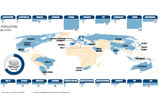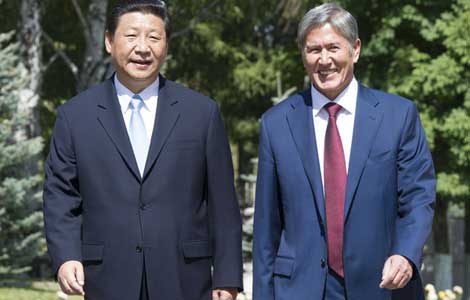
Full text: President Xi's joint written interview with media from Turkmenistan, Russia, Kazakhstan, Uzbekistan, Kyrgyzstan
Updated: 2013-09-03 21:54
(Xinhua)
|
|||||||||
4. The Eighth G20 Leaders' Summit will soon be held in St Petersburg, Russia. What does China expect from the summit?
The G20 Leaders' Summit will soon take place in St Petersburg. At a time when world economic growth lacks momentum and the deep-seated impact of the international financial crisis goes on unabated, it will be an important meeting among leaders of the world's major economies. China supports the St Petersburg summit to focus on growth and employment to promote even closer partnerships among G20 members, strengthen their macro-economic policy coordination and jointly usher in a brighter future for the world economy.
First, G20 members should adopt responsible macro-economic policies. It is important that each country should, first and foremost, manage its own affairs well, keep its own economic house in order, and enhance economic competitiveness through vigorous structural reforms. On the basis of this, parties should step up policy coordination, make sure that the spillover effect of their policies are positive, not otherwise, and work together to meet the major risks and challenges in the international economic and financial fields.
Second, the G20 should uphold and promote greater openness in the world economy. Countries should categorically oppose protectionism of all forms, promote an early harvest of the Doha Round negotiations, and safeguard a free, open and non-discriminatory multilateral trading regime. Efforts should be made to deepen economic integration among countries, build a global value chain, and avoid fragmentation of markets and trading systems. This will contribute to win-win development of all countries.
Third, the G20 should work to improve global economic governance. It should continue to increase the representation and voice of emerging markets and developing countries. In particular, it should speedily implement the quota and governance reform plans for the IMF, complete on time IMF's quota formula adjustment and the next round of general quotas review by January 2014, and review the basket of currencies for special drawing rights as scheduled for 2015.
Fourth, the G20 should strive to be a development partner for developing countries. It should fully harness its own advantage and demonstrate greater political commitment to pushing for solutions to global development issues. It should forge more effective global partnerships on development, and mobilize more economic resources to tackle a greater number of development challenges.
Related Stories
Xi meets Turkmenistan's president on ties 2013-09-03 19:39
Xi's planned visit to Turkmenistan lauded 2013-09-03 01:13
China-Turkmenistan ties becoming strategic 2013-09-02 06:54
China, Turkmenistan vow to strengthen co-op 2013-07-19 15:27
Schedule









